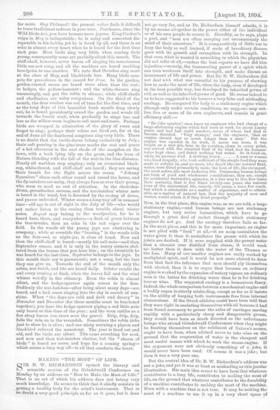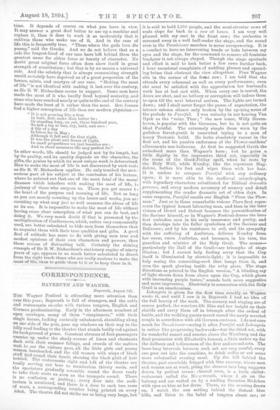MAKING "THE MOST" OF LIFE.
SIR B. W. RICHARDSON opened the literary and scientific section of the Grindelwald Conference on Monday by an address on " How to Make the Most of Life." That is an art of which his address does not betray very mulch knowledge. He seems to think that it chiefly consists in getting a healthy body for the mind's instrument. That is no doubt a very good principle so far as it goes, but it does not go very far, and as Dr. Richardson himself admits, it by no means altogether in the power either of the individual or of his own people to secure it. Heredity, as he says, plays a part, and "men are often carrying out unconsciously the mind of their ancestors." It is comparatively of little use to keep the body so well trained, if seeds of hereditary disease grow with its growth and strengthen with its strength. In that case, what is wanted is something to which the physician did not refer at all,—unless the best reports we have did him injustice,—namely, the transmuting power of a spirit which can turn weakness itself into strength, and make disease an. instrument of life and power. But Sir B. W. Richardson did not deal with what was essential to his purpose of showing, how to make the most of life, when the body, even if developed in the best possible way, has developed its inherited germs of evil, as well as its inherited germs of good. He seems indeed to As to have suggested to his hearers a very false and misleading analogy. He compared the body to a stationary engine which (though only under certain conditions, we suppose) may out- live five or more of its own engineers, and remain in great efficiency still:— "He [the speaker] once knew an engineer who had charge of a large stationary engine which had been at work for about ninety years, and had had eight masters, seven of whom had died or- become disabled. Very strange,' said the engineer, 'that an engine should last so much longer than a man' But the engine was equable in its work, it never ran loose, it was bright as a new pin, true in its vocation, clean in every point, was served with the simplest food of its kind, had its furnace- tubes kept clear, and drank nothing but water. So it lived on, while its masters died. A striking lesson A man or woman who lived frugally, who took sufficient of the simple food they were made to subsist on, and no more, who drank the one natural fluid, water, were fitted primarily to make the best of life, the strongest, the most active, the most enduring life. Presuming human beings are born of good and wholesome constitutions, they are, except for accidental destructive agencies, in a fair way to live five times their maturity, that is five times twenty-one years, the natural term of the anatomical life, namely, 105 years, a term few reach, but which is attainable as a matter of experience, and so attain- able, as a matter of natural law, that the majority of men and= women would attain it if they lived properly."
Now, in the first place, this engine was, as we are told, a large- stationary engine,—and human beings are not stationary engines, but very active locomotives, which have to go, through a great deal of racket through which stationary engines do not go. And the analogy therefore fails so far..
In the next place, and this is far more important, an engine is not plied with "food" at all,—it no more assimilates the water given it than it assimilates the grease with which its joints are daubed. If it were supplied with the purest water that a chemist ever distilled from steam, it would work no better than it does with the water of the Thames or the Lea. Many of our smaller engines are really worked by methylated spirit, and it would be not more absurd to draw from that fact the inference that men should ply themselves with alcohol, than it is to argue that because an ordinary engine is worked by the expansion of watery vapour, an ordinary' man is the better for drinking water than he is for drinking beer or wine. The suggested analogy is a humourous fancy. Indeed, the whole comparison between a mechanical engine and a bodily organ is utterly misleading, except so far as it insists on the utility of keeping both instruments free from internal obstructions. If the Greek athletes could have been told that they were right in anointing themselves with oil because it had been found necessary to grease the axles of carriages moving rapidly with a particularly cheap and disagreeable greaser they would have been as much diverted as the unfortunate beings who attend Grindelwald Conferences when they might be feasting themselves on the sublimest of Nature's scenes, ought to have been, when advised never to take wine on the ground that the evaporation of water is the cheapest and• most useful means with which to work the steam-engine. If the argument were not obviously something of a joke, it would never have been used. Of course it was a joke ; but then it was a very poor one.
But the central idea of Dr. B. W. Richardson's address was not a joke, and yet it was at least as misleading as this jocular illustration. His main idea seems to have been that whatever contributes to a long life, contributes to making the most of life, on the ground that whatever contributes to the durability of a machine contributes to making the most of the machine. Even with a machine that is not true. It may be making the most of a machine to use it up in a very short space of time. It depends of course on what you have in view. It may answer a great deal better to use up a machine and replace it, than it does to work it so moderately that it -outlives those who make use of it. And in the case of life this is frequently tree. "Those whom the gods love die young," said the Greeks. And we do not believe that as a rule the longest-lived of our race have left behind them the greatest name for either force or beauty of character. No doubt great original force often does show itself in great strength of constitution ; but that is by no means a universal rule. And the sobriety that is always economising strength would certainly have deprived us of a great proportion of the heroes, saints, and martyrs of our race. "Making the most -of life" is not identical with making it last over the century, as Sir B. W. Richardson seems to suggest. Some men have made the most of it who hardly lived beyond maturity, and some who have reached nearly or quite to the end of the century have made the least of it rather than the most. Ben Jon son had a higher conception of life than our modern physician :- " It is notgrowing like a tree In bulk, loth make Man better be ;
Or standing long, an oak, three hundred year, To fall a log at last, dry, bald, and sero A lily of a day Ts fairer far in May; Although it fall and die that night,
It was the plant and dower of Light.
In small proportions we just beauties see ; And in short measures life may perfect be."
in other words, life should be judged not by its length, but by its quality, and its quality depends on the character, the gifts, the genius by which its most unique work is determined.
How to make the most of life is not discovered by such tests as Sir B. W. Richardson applies. He only touched the more serious part of his subject at the conclusion of his lecture, where he pointed out that one of the most fatal of the moral diseases which interfere with making the most of life, is jealousy of those who surpass us. There you get nearer t the heart of the purpose and meaning of life. But so long as you are merely counting up the hours and weeks, you are counting up what may just as well measure the abuse of life as its use. It is impossible to make the most of life without having some clear conception of what you can do best, and .doing it. We very much doubt if that is promoted by the multiplication of Conferences, which, unless very economically used, are better calculated to hide men from themselves than to acquaint them with their true qualities and gifts. A good -deal of solitude has more to do with giving men true and modest opinions of their own characters and powers, than these oceans of distracting talk. Certainly the shining -example of Sir B. W. Richardson's stationary engine of ninety years of age, appears to us much better calculated to divert from the right track those who are really anxious to make the most of life, than to guide them to it or to keep them in it.



































 Previous page
Previous page